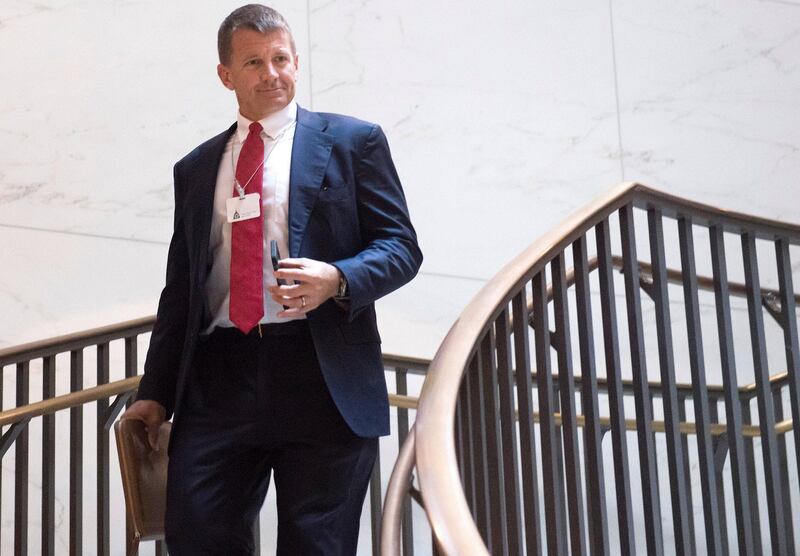Blackwater founder Erik Prince believes he has an “audience of one” to persuade to back his plan to turn the war effort in Afghanistan over to an army of private contractors backed by its own air force in a move that would see US and Nato forces largely withdrawn.
The 49-year old former US Navy Seal told a briefing in London that he could reduce the cost of America’s policy in Afghanistan from $52 billion (Dh191bn) annually to just over $10bn.
Mr Prince is calling on President Donald Trump to scrap the Afghan plan that his administration launched exactly a year ago on Tuesday. The centrepiece of the Prince proposal is a reduction in the US troop presence in the country to just 2,000 from the 16,000 there today.
A new strategy would see 6,000 contractors work on three-year contracts to provide a skeletal support staff for the Afghan army. A fleet of 90 combat aircraft would provide back-up for the deployments. He believes President Trump is open to the idea.
Listening to Erik Prince pitch his plan for peace in Afghanistan at a London think tank. Prince starts his speech by trashing McMaster as “a three-star general who wanted a fourth star” and was incapable of doing something “unconventional,” namely, adopting Prince’s plan
— пигманович (@lincolnpigman) September 17, 2018
Having sold Blackwater (a private security contractor now known as Academi), Mr Prince runs the Frontier Service Group and has become identified with a radical blueprint to rip up the whole approach to the 17-year conflict.
“We may disagree on the methods but I think there is one thing we would all like to agree on - the end of war in Afghanistan,” he said. “We were almost there last summer. The national security apparatus said [to President Trump] you can pull out and Afghanistan will melt down like Iraq.”
The Prince plan was opposed by the then US National Security Adviser HR McMaster and Jim Mattis, who is still the US defence secretary. Weeks later they released a strategy that increased the number of US troops and scrapped a timeline for withdrawal left over from administration of Barack Obama.
“The president gave them more money and more troops and they promised results and there’s no results,” Mr Prince said.
_________
Read more:
Afghan Taliban announces death of Haqqani network leader
It's time to talk peace, Nato's Afghan envoy tells Taliban
Suicide bombing kills protesters in eastern Afghanistan
__________
With US officials reportedly meeting with the Taliban for exploratory peace talks, Mr Prince is scornful of the prospect of a successful outcome
“We need to go back to tactical innovation and deviousness,” he said. “The Taliban are not commuting to war, we are.
“There’s not going to be a Versailles moment, they’re not going to line up and surrender or reconcile. The Taliban would be very willing to accept our surrender.”
Eleven years after Blackwater’s name forever became associated with the deaths of 17 civilians in an uncontrolled shooting spree in Baghdad’s Nisour Square, Mr Prince remains adamant that his industry can be part of the solution to long-running conflict. “The Blackwater name got so tarnished and so blown out by one event in Iraq,” he said. “In the Iraq war, the anti-war left went after the contractors.”
Those familiar with private military forces say Erik Prince's plan to privatize the war in Afghanistan is unlikely to work and seems instead designed to make him rich, Deborah Avant writes for Washington Post. https://t.co/J49LvRCrJ6
— The War Horse (@thewarhorsenews) September 17, 2018
With proper mentoring from dedicated military veterans and basic support such as medical evacuation for injured troops, Mr Prince also believes Afghanistan's security forces could perform better.
“Men will fight harder when they know someone will look after them,” he said.
The duration of the war is Mr Prince’s main indictment of the US involvement. “I am not ready for multi-generational war. I have two sons who will likely follow my footsteps and join the service. The idea of them going to Afghanistan to get blown up or dead — no way.”
While he has not engaged with the Afghan President Ashraf Ghani on his idea — instead he touts a video he made to sell his plan in the Dari language — Mr Prince brushes off the idea that it is not politically feasible.
Having seen Mr McMaster replaced by John Bolton, a known sceptic of large overseas deployments, there is one less brake on Mr Trump to follow his instincts when shown the Prince plan.
“As much scoffing as I got last year when I predicted another year of the same results, there’s not as much this year,” he said. “If they keep doing the same thing, I’m not going away.”






